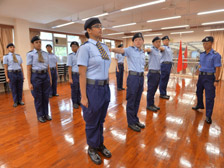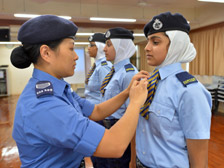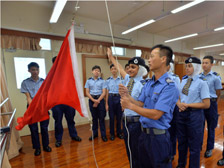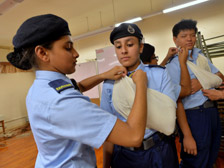
Harmony goal:
The Civil Aid Service hopes that non-Chinese students can more easily integrate into the community by learning team spirit through training.
Harmony goal:
The Civil Aid Service hopes that non-Chinese students can more easily integrate into the community by learning team spirit through training.

Minor alteration:
The Civil Aid Service adjusted its uniform dress code to allow Muslim cadets to wear headscarves under their berets.
Minor alteration:
The Civil Aid Service adjusted its uniform dress code to allow Muslim cadets to wear headscarves under their berets.

Pennant pride:
Members learn to raise the national and regional flags to strengthen their sense of national identity.
Pennant pride:
Members learn to raise the national and regional flags to strengthen their sense of national identity.

Disaster ready:
Cadets learn life skills such as first aid and orienteering, of value in rescue and search.
Disaster ready:
Cadets learn life skills such as first aid and orienteering, of value in rescue and search.
Cadet Corps embraces minority members
August 10, 2014
The Civil Aid Service, whose slogan is ‘Strict with yourself and others’, recently bent one of its own rules, to allow non-Chinese speaking youngsters to join its Cadet Corps to promote social harmony.
Since the corps’ founding in 1968, it had required all applicants to be able to speak fluent Cantonese and read Chinese. That changed this year when it began recruiting ethnic minority students from Caritas Tuen Mun Marden Foundation Secondary School.
Now a 21-member platoon includes 14 non-Chinese cadets – whose families come from Pakistan, Nepal, the Philippines and Africa - who undergo disciplinary and vocational training and perform community services.
Cadet Corps D Company Staff Officer Andrew Tse says the aim is to help the non-Chinese students integrate into the community more smoothly, to be the future leaders and responsible citizens.
The once-a-week training session is demanding. Under the hot sun, the platoon is doing foot drills – and enjoying themselves immensely. They have different religious and cultural backgrounds, but share a common aspiration: to learn self-discipline and serve the community.
The foot drills hone their ability to pay attention to commands. They also learn basic rescue, leadership, first aid, life-saving, mountaineering, map reading, home safety and other skills.
Overcoming barriers
Hajra Bibi, 14, was born in Hong Kong to Pakistani parents. She communicates with them in Urdu, and speaks in English with her mostly ethnic-minority friends at school. She was eager to join the uniformed groups when she entered secondary school, but found that language was a barrier, as were some aspects of her cultural background.
When the corps began recruiting non-Chinese students, her father opposed her joining as he worried she would not be allowed to wear her headscarf. To respect different religions and cultures, the Civil Aid Service adjusted its uniform dress guidelines, and Bibi was allowed to sign up.
Since then her circle of friends has expanded to include Chinese-speaking fellow corps members, enriching her social life.
Punctuality lesson
Cadet Kwok Tak-shing, 14, came to Hong Kong from Shenzhen to study at secondary school three years ago. His reason for joining was to improve his self-discipline. The corps encourages strict adherence to rules, and uses punishment and reward systems to achieve this.
The young man who was habitually tardy learned to be punctual through his Civil Aid Service training, and won its Best Disciplined award. If he was late for school, he had a mark recorded against him, but there was no punishment.
“If I’m late for the corps training, though, I will be punished by having to do more than 20 push-ups. It’s quite harsh, so I make sure I’m not late – for anything,” Tak-shing said.
Confidence boost
For cadet Marric Abbago, 14, the corps training has proved transformational. He was born in Hong Kong to Filipino parents. He admits before he joined he was “a really naughty boy” with no self confidence who shouted in school a lot. In just two months of training, he underwent a personality makeover.
“I am quiet and patient now,” Marric said, adding, “it is a big change.”
Caritas Tuen Mun Marden Foundation Secondary School Supervisor Patrick Fung says the school encourages students to participate in the Cadet Corp training, to take the opportunities it provides to serve the community, learn practical skills, hone their communication skills, and learn to respect people, he said.
“It is a useful learning experience outside the classroom.”
The Civil Aid Service plans to co-operate with other schools in Yuen Long and Kwun Tong districts, to establish more platoons that include non-Chinese members, to help them more easily integrate into the community and become future leaders.